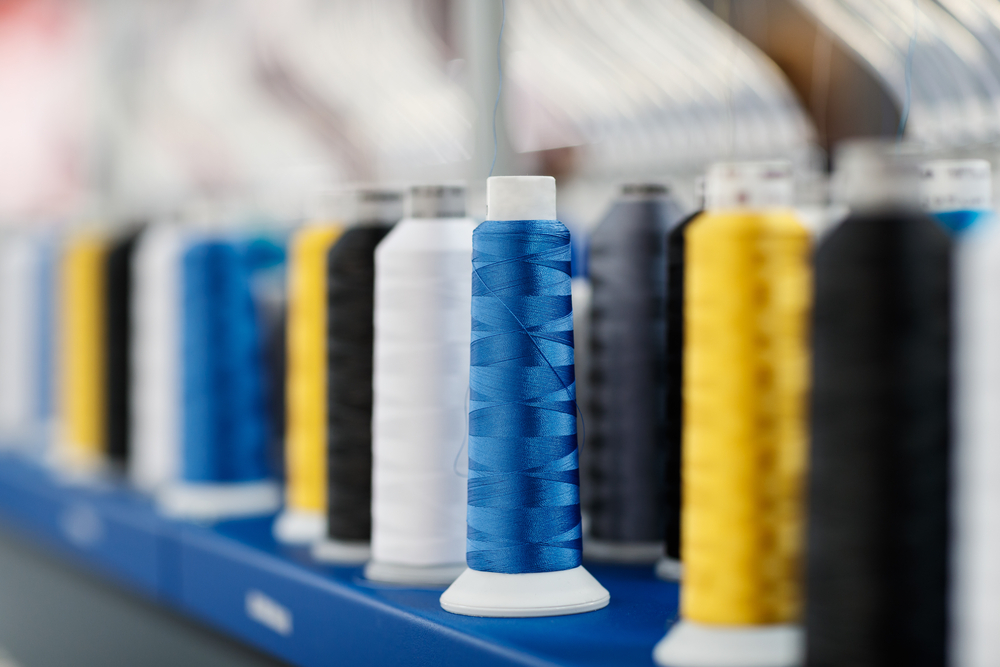Today’s clothing has a material that many people don’t even realize. It can have the feel of wool, linen, or silk and because it’s so versatile, it can be found in your jeans, shoes … practically everything you wear.
What is this mystery material? If you guessed plastic, you’re right. In fact, plastic is found in two-thirds of our clothing and can take the form of synthetic fibers such as acrylic, elastane, and nylon. The most common is polyester which makes up 52% of all fiber production.

The Problem of Plastic Materials in the Fashion Industry
The raw materials of these types of fibers are fossil fuels which affect our climate negatively. The production of textiles takes up 1.35% of the global oil production and contributes to the fashion industry’s significant climate footprint. These materials continue to impact our environment long after they are produced because they shed plastic microfibers when the clothes are washed.
The Rise of Recycled Synthetic Fibers
A growing number of brands are switching to recycled versions of synthetic fibers to position themselves as sustainable and conscious companies.
The Changing Markets Foundation did a survey and found that 85% of the brands that participated were planning to source recycled polyester from plastic bottles. The common recycled substitute for virgin synthetics is polyethylene terephthalate (PET) bottles which are produced in the billions every year. This is good news because it is estimated that using recycled polyester instead of virgin polyester could reduce emissions by up to 32%.
And the demand for recycled synthetics is expected to accelerate. Nike is the highest user of recycled polyester in the industry, diverting more than 1 billion plastic bottles on average a year from landfills.
Many brands are following suit by setting up their own target, such as Gap, H&M, J Crew, and Madewell, becoming a part of the recycled polyester challenge and committing to increase the share of recycled poly to 45% by 2025.
Are Recycled Synthetics the Total Solution?
Unfortunately, recycled synthetics aren’t magic bullets that will make the environmental problems go away. Some experts question whether its use is just a patch-up job to a big wound. People sometimes use the words “recycle” and “sustainable” interchangeably — But they aren’t the same thing.
Companies might mix up the words in the marketing of their products and there’s a major concern that it will cause consumers to believe their purchases are impact-free — and that is far from the truth.
Recycled synthetics are an improvement but it doesn’t make the problem of microplastics go away. Even though they are recycled, these fibers are still shed from plastic yarns.
Also, PET bottles can be recycled at least 10 times. The fear is that using these bottles for clothing will accelerate the plastic’s journey to the landfill because the clothing won’t get recycled. Fast-fashion garments which are low-quality and discarded after a few uses could make problems worse.
Companies could end up using recycled plastics and their marketing to exploit the desires of responsible consumers who want to live more sustainably and actually cause more damage to the environment.
The Real Problem
Hyping the lower emission impact of recycled yarn could end up just being a distraction to solving the real problems in the industry, such as the energy that is used at textile mills.
Textile mills process fibers into yarn and the process accounts for 76% of a garment’s lifecycle emissions. Some experts believe a better solution will be to find viable alternatives to fossil fuel-derived synthetics that can perform the same way.
Kintra Fibers has developed bio-based fibers that are made from corn and wheat so that they can compost naturally. It can also be chemically recycled back to its base components and used as a feedstock for circular yarn production.
Another solution that could help solve the main problem is moving the industry away from excessive production and consumption through legislation that creates systematic change.

At Karmagawa and SaveTheReef we’re concerned about the environment and want to do all we can to put information out so that our community can join in the fight for real change. We only have one planet and we have to do what we can to save it — Along with all the living things.
Do you want to know what is going on around the world in regards to the environment and its beautiful animals? Please follow us on Twitter and Instagram and we’ll keep sending you more updates about animals and the environment from around the world. Share our information with your friends and family so that they stay aware, as well.
Do you have stories that you want to expose through video? If so, movies are a powerful way to get your message out.
Our friend and pro filmmaker Amir Zakeri created an online class for us to help the community learn how to create their own movies and documentaries — here’s 50% off.
You’ll be helping important causes, so don’t hesitate. Get started now.
What do you think about the increase in the use of recycled materials in clothing? What kind of impact will it really have on our planet? Leave a comment below.
Cover Image: bbernard/Shutterstock

